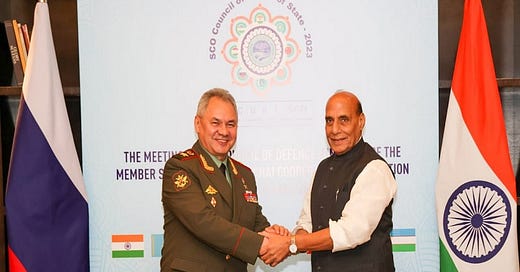Casual observers usually prefer for the intricacies of International Relations to be simplified in order to facilitate their understanding of complex processes, but this risks inadvertently misportraying key players’ policies. Such is the case when it comes to Russian-Indian relations at this point in the New Cold War since superficial assessments of those two’s official stances towards the US-Quad and China-apps respectively can easily lead to false impressions of their bilateral ties.
Russian Defense Minister Sergey Shoigu made headlines across India after his speech at the latest SCO meeting in Delhi. Local media picked up on his remarks about how the Quad is working closer with NATO as part of a US plot to contain China, which some spun to imply that Russia and India are thus on opposite sides in the New Cold War. It’s important to clarify what he said and then place his insight into the appropriate context in order to prevent casual observers from being misled by false assessments.
Publicly financed TASS, which is regarded as among Russia’s most reliable news outlets, reported that Shoigu said the following: “[The Quad and AUKUS] are being spliced with NATO, which, in turn, lays claim to a dominant role [in the Asia-Pacific] as well.” The Russian Ministry of Defense’s official website, however, didn’t include that remark in their report about his speech. Readers can confirm for themselves here, after which they’ll see that NATO and the Quad were only mentioned once in their summary.
This doesn’t mean that Shoigu didn’t say what TASS reported, but just that the Ministry of Defense apparently doesn’t want that point to occupy disproportionate attention in terms of the grand strategic picture that he described. Instead, they’re content with readers simply being informed that “Military and political alliances, such as QUAD and AUKUS, initiated similar countermeasures” as the US did for countering regional multipolar processes by taking away from ASEAN’s key role in the Asia-Pacific.
Nevertheless, it’s understandable why some observers might interpret this as a jab against India since it’s a founding member of the Quad, but that’s arguably not what he intended. Several factors are at play at once from the Kremlin’s perspective: 1) India participates in the Quad due to shared interests; 2) it remains strategically autonomous despite immense US pressure; 3) but Delhi’s Australian and Japanese partners are indeed integrating with NATO as part of America’s plot to dominate the Asia-Pacific.
The abovementioned assessment is based on the following facts: 1) President Putin applauded Prime Minister Modi’s independent foreign policy last October; 2) Foreign Minister Lavrov invited India to join the Afghan Quartet last week; and 3) Shoigu and his Indian counterpart praised their ties on Friday. In the order that they were shared, this proves that: 1) Russia appreciates India’s strategic autonomy; 2) Moscow doesn’t regard it as a US proxy in the region; and 3) their military ties remain strong.
“Splicing” these two analyses together, to borrow from Shoigu’s reported terminology, the Kremlin’s stance can be summarized as warning that the US plans to take advantage of regional groups in order to advance its anti-Chinese agenda. Despite India being part of the Quad, which is one of the two groups alongside AUKUS that Shoigu drew attention to in this respect, it remains strategically autonomous and therefore doesn’t let America influence its policy formulation process.
Just like Russia is worried about how the US could exploit regional groups to obtain an edge against China, so too is India worried about how China could exploit apps to gain an edge against others, hence why it’s banned hundreds of them in the past few years. India founded one of the same US-led groups that Russia warned about, just like Russia still allows its citizens to use most of those same Chinese apps that India banned, yet neither regards the other as anyone’s proxy as was earlier proven.
Casual observers usually prefer for the intricacies of International Relations to be simplified in order to facilitate their understanding of complex processes, but this risks inadvertently misportraying key players’ policies. Such is the case when it comes to Russian-Indian relations at this point in the New Cold War since superficial assessments of those two’s official stances towards the US-Quad and China-apps respectively can easily lead to false impressions of their bilateral ties.
Like was earlier shared, several factors can be at play at the same time: 1) Russia-China, India-US, and Russia-India have close security ties; 2) Russia is concerned that the US can exploit the Quad in which India participates just like India is concerned that China can exploit apps that Russia still lets its citizens use; but 3) Russia and India deeply appreciate each other’s strategic autonomy and know that neither is a proxy of their own country’s top rival.
Those who spin remarks about third countries from either of those two’s officials to imply that their words supposedly prove that Russia and India are on opposite sides in the New Cold War either don’t understand the intricacies of International Relations or are deliberately trying to mislead others about them. Regardless of whether their intent is innocent or malicious, these folks can’t be relied upon for accurate insight into their relations until they publicly correct their false assessments of the aforesaid.




